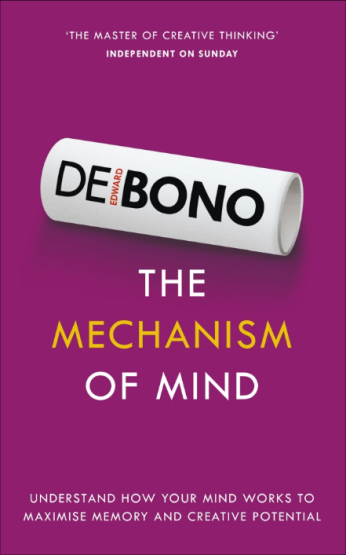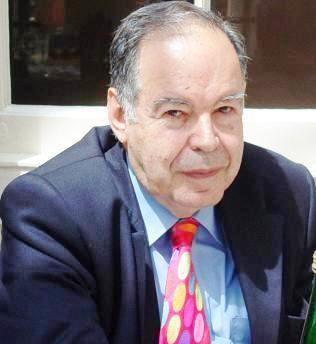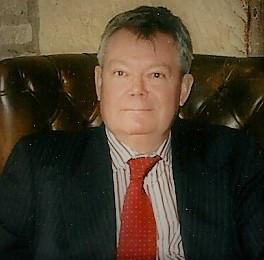delighted Gijs and Asa are to introduce Dennis Perrin, who has kindly written this blog post. Enjoy!
1. Creativity and de Bono Thinking
2.Training makes the difference
3.Some experiences with the de Bonos
Creativity and de Bono Thinking
In the early seventies I bought Dr de Bono's book " The Mechanism of Mind ". In the book, models are assembled which show how "the brain becomes mind". Certain parts of the book had special meaning for me in explaining how thinking patterns become routines, how to escape patterns, and how to develop creative ideas. I was also very struck by an interesting and graphic description of how memory works. These ideas gave me hope for the future and brought a new meaning to life. Later I became a trainer in de Bono thinking skills. I wanted to share the power of escaping old ideas and the excitement of creating new ideas. When you know you can be creative, and you know you have general thinking skill, the combination is powerful and exciting.

To many people, or even to most people, the idea of thinking and creativity development as a learned skill sounds complicated, intellectual, philosophical, difficult. But it is none of these things. Developing skill in thinking is simple. Personally, I cannot write about thinking and creativity without simultaneously including Dr Edward de Bono, Peter de Bono, de Bono Master Trainers, and all of the 80 or so books that Dr de Bono has written. In a way, I am over the top about it all. Yet to gain skill in thinking and to become creative is a simple process that anyone can do through a little training.
The enemies of good thinking are complexity and the assumption that argument is somehow part of it. Most of the time - in creative thinking and in using de Bono thinking tools -argument is left outside. Historically argument has been important in deciding who is right, which religion is right, and in the promulgation of political ideas. Once you become a trained thinker, essentially there is no argument, the mind becomes free of adversarial thinking, and there is a new - found confidence and self-esteem. Argument is used sometimes only sparingly but better thinking generally replaces argument.
So, creativity cuts across the normal patterns in thinking and produces new ideas. To become creative we simply practise thinking tools. We do not become geniuses but we do have the tools to create small ideas besides big ideas. Small ideas are also important; otherwise we will always feel inadequate, expecting only the Richard Bransons of the world are able to be creative. So very importantly: anyone can develop creativity, since it's a skill in the same way that driving a car is a skill. Creativity is not inherent, not natural, and not confined to artists or highly intelligent people. In fact many highly intelligent people are bad thinkers because they are obsessed with argument, being right, and proving points. This is very limited thinking but it attracts attention in politics because the emphasis in politics is on articulation. One can articulate a bad idea well. An inarticulate person including children have been shown to be quite good thinkers, while many politicians are not.
Training Makes the Difference
Normal education is training in the syllabus laid down by the government's education department. We are trained in history, maths, language, etc. Much of this is needed but also much is unnecessary and there is much left out of education. Thinking and social skills are mostly left out. In my opinion there is only one master author of thinking and that is Dr Edward de Bono. There are many copycats who use his methods under different training guises, but he started it all off and it's only fair that I give him the credit. There are others "possibly in the field of thinking" like Tony Buzan but Edward de Bono devised thinking skills on a systematic basis.
Training in thinking is essential for all of us. Just reading the books is good but we then forget most of the substance of the books. They are interesting to read but do not provide training. Because we have been educated into argument we have also been educated into criticism, and we believe that if we can criticise something, then that is rather clever thinking. Not so. We need the tools of creative thinking. Children are good thinkers - if only they are given the chance. Training in thinking is simple and enjoyable and fun. Young people love having ideas, and with de Bono training, young people are given a simple powerful structure which is simple and easily remembered through use.
In the beginning thinking training is a little challenging. I have no intention of giving away the details of the training here since it is strictly copyright, as it should be. It cannot be given away any more than food or cars are given away freely. There is only effort needed from participants. It is like learning to ride a bicycle. The trainer gives exercises and careful watch and personal attention is given to output. There is some discussion but no more than necessary. Learning thinking is learning a discipline. There is the discipline of time, of using the tool correctly, and focus, which improves as the tools are used. The instructor's job (my job) is to ensure the tools are learned in the way in which they were designed to be used.

The old-fashioned way of teaching by telling is not used in the teaching of thinking. Students being trained produce ideas constantly and in their own production of ideas they then become aware of the power of using thinking tools. There are many teachers around who are not accredited and trained and who do thinking a disservice by teaching thinking badly. It must be done well by a trained facilitator (my job!). Students work alone sometimes, sometimes in pairs, sometimes in groups, and occasionally the whole class works together on subjects for thinking. The subjects in themselves are not important. Complex problems are not used. There are no trick questions or tests. The emphasis is on the production of ideas using tools and it is this tried and trusted process that produces thinkers.
Some Experiences with the De Bonos
After a de Bono course with Wolsey Hall Oxford 1984-86 I attended a thinking course in 1999 with Peter de Bono at his home in Oxford. Peter is Edward de Bono's brother who is also a Master Trainer in de Bono Thinking. When I got home, my wife exclaimed: "Tell Peter he has given me my husband back! " I started to become seriously focussed. Peter's training impressed me profoundly and I immediately started training others in the way that he had trained me, with some considerable success where I was living in Cornwall at that time.
In 2001 I moved back to the Oxford area (this was the same area I moved to in 1987, when I returned from Cape Town). I became Peter's personal assistant and looked after his office when he was away training in China. I took all the calls that came in for de Bono inquiries, and attended to office matters. From 2000-2002 I took a further three courses separately in order to become accredited in teaching the de Bono thinking skills: Lateral Thinking, The Six Thinking Hats, and DATT, the Direct Attention Thinking Tools.

Edward de Bono
In year 2000 I first met Edward de Bono at a seminar for European trainers held in London. I became a friend and often had meals with Peter and his wife Valerie, and they came to us for lunches. Over time I learned deeper truths concerning training in thinking skills. In 2003-2006 I met Edward de Bono in hotels for drinks and chats, in Piccadilly (London) restaurant near his home, and I formally interviewed him in his flat in Piccadilly. I discussed intricacies of questions concerning training and lateral thinking directly with him and he was always kind and patient. In short, I felt like a member of the family and indeed the worldwide Edward de Bono network became a part of my life. Dr de Bono sent me to Shanghai to train Du Pont executives, to Morocco to train a shipping company, and I taught at Oxford, Norwich City College, London and many places gaining experience in handling questions and how to teach thinking simply and effectively. And of course I was always paid handsomely for my work.
If your intention is to learn thinking and creativity, I guarantee the de Bono training will do just that.
Dennis Perrin is Director at Edward De Bono Training.

